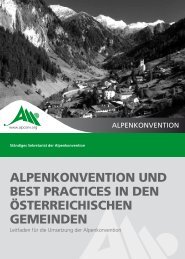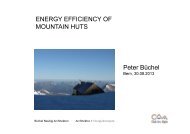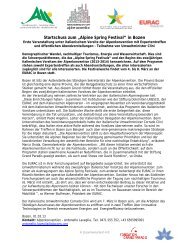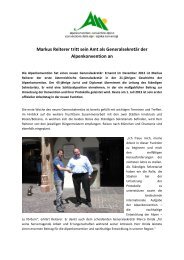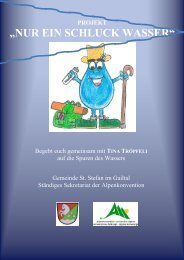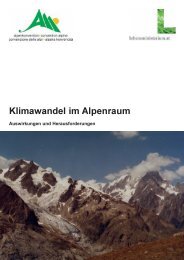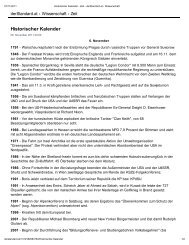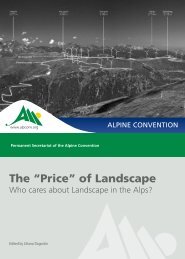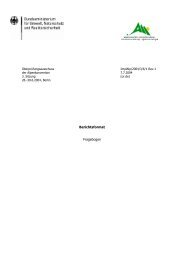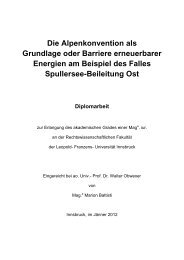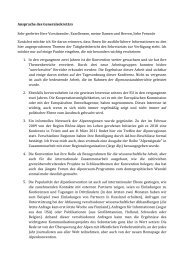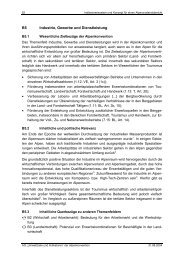- Page 1 and 2: Université de Paris 1 - Panthéon-
- Page 3 and 4: LA CONVENTION ALPINE, UNE ORGANISAT
- Page 5 and 6: Résumé Les travaux récents sur l
- Page 7: Titolo - titre en italien La Conven
- Page 11 and 12: Liste des abréviations AAA Agenda
- Page 13: PDC Parti démocrate-chrétien PIB
- Page 17 and 18: CONSIDERATIONS INTRODUCTIVES L’é
- Page 19 and 20: 2009. 1 L’état comme forme d’o
- Page 21 and 22: préjugé que son étude appartient
- Page 23 and 24: invités à contribuer à plusieurs
- Page 25 and 26: Communauté andine de 1969, qui ré
- Page 27 and 28: l’action pour le développement d
- Page 29 and 30: En principe, nous aurions pu employ
- Page 31: Nous invitons donc nos « cinq lect
- Page 35 and 36: principe d’harmonisation écorég
- Page 37: I CADRAGE THEORIQUE
- Page 40 and 41: « régionale » était la plus app
- Page 42 and 43: éférence », dans les années 90,
- Page 44 and 45: plaines et des reliefs - se trouven
- Page 46 and 47: Figure 1 : Carte des écorégions
- Page 48 and 49: sous-régions alpines, ou encore de
- Page 50 and 51: paces et leurs temporalités. Au ni
- Page 52 and 53: assisté à une décentralisation p
- Page 54 and 55: mondiales comme l’UE (une allianc
- Page 56 and 57: lissement du rôle de l’état ».
- Page 58 and 59: les perspectives réaliste et const
- Page 60 and 61: nelle, qui repose sur les chaînes
- Page 62 and 63: Figure 2 : Périmètre de la Conven
- Page 64 and 65: Figures 3 et 4 : Propositions du PN
- Page 66 and 67: Figure 5 : La région carpatique se
- Page 68 and 69: Figure 6 : Une proposition pour une
- Page 70 and 71: On peut soutenir que l’une des co
- Page 72 and 73: espaces « sont intégrés dans des
- Page 74 and 75: connu comme biorégionalisme, il cr
- Page 76 and 77: qui révisent la littérature fréq
- Page 78 and 79: lement ou fortement. 1 Il va de soi
- Page 80 and 81: tion dans le champ, qui peut être
- Page 82 and 83:
que la plupart de ces phénomènes
- Page 84 and 85:
cette petite communauté savante ?
- Page 86 and 87:
Or, de ce point de vue, l’image d
- Page 88 and 89:
ééchelonnement vertical ou horizo
- Page 90 and 91:
ciale pour le Delta du Danube, qui
- Page 92 and 93:
« Programme régional des mers »
- Page 94 and 95:
d’écorégionalisation marin, le
- Page 96 and 97:
les régions de montagne, des conve
- Page 98 and 99:
tournant pourrait être représent
- Page 100 and 101:
existante, sur des conversations in
- Page 102 and 103:
La discipline des relations interna
- Page 104 and 105:
clé pour l’économie de la régi
- Page 106 and 107:
Cependant, la région alpine prése
- Page 108 and 109:
sèquement humaines et peuvent enco
- Page 110 and 111:
gens qui vivent dans les Alpes est
- Page 112 and 113:
pris vis-à-vis des autres régions
- Page 114 and 115:
Alpes. Par exemple, le Ministère f
- Page 116 and 117:
telle que les questions déléguée
- Page 118 and 119:
la Slovénie et de Monaco, qui ne c
- Page 120 and 121:
Ceci ne signifie pas que ces partie
- Page 122 and 123:
Figure 11 : Les régions identifié
- Page 124 and 125:
une époque où la Convention alpin
- Page 126 and 127:
Le cas « bizarre » de la Communau
- Page 128 and 129:
entier, de l’équateur aux villes
- Page 130 and 131:
L’Initiative andine du Partenaria
- Page 132 and 133:
Figure 12 : Carte des paysages cult
- Page 134 and 135:
la ligne de la côte du Mexique au
- Page 136 and 137:
niveau national, particulièrement
- Page 138 and 139:
l’accent sur les zones de páramo
- Page 140 and 141:
nombre et l’activisme des ONG éc
- Page 142 and 143:
Situation politique De manière sim
- Page 144 and 145:
ne peut pas être sous-estimé, si
- Page 146 and 147:
páramo uniquement, CONDESAN n’a
- Page 148 and 149:
et culturel traditionnel. Les minis
- Page 150 and 151:
Alpes, il semble que les présidenc
- Page 152 and 153:
actuelles se soient améliorées, l
- Page 154 and 155:
dans l’UE, mais elle montre des a
- Page 156 and 157:
à l’UE, qui est passée de la PA
- Page 158 and 159:
liards de dollars. 1 En 2008, la CA
- Page 160 and 161:
té andine, du Traité amazonien et
- Page 162 and 163:
les deux cas, si toutes les parties
- Page 164 and 165:
laires peuvent être formulées par
- Page 166 and 167:
avec ses études sur la santé et l
- Page 168 and 169:
moins pour certains individus. Quan
- Page 171 and 172:
3 Genèse : phase constitutive A no
- Page 173 and 174:
l’an 2000 et la création des ins
- Page 175 and 176:
Humboldt, à « exposer ce qui a eu
- Page 177 and 178:
totalité des échanges commerciaux
- Page 179 and 180:
à l’intérieur du territoire alp
- Page 181 and 182:
un réservoir important de biodiver
- Page 183 and 184:
Peut-être plus que pour les autres
- Page 185 and 186:
des élections libres, un conseil c
- Page 187 and 188:
protection des Alpes (CIPRA), afin
- Page 189 and 190:
en catalysant leur montée dans les
- Page 191 and 192:
C’est à ce stade qu’intervient
- Page 193 and 194:
outils pour l’aménagement du ter
- Page 195 and 196:
Madrid) qui, avec ses protocoles, c
- Page 197 and 198:
Dolomites, ou les grands tunnels de
- Page 199 and 200:
dimension plus « amplement politiq
- Page 201 and 202:
afin de signer le protocole institu
- Page 203 and 204:
Trente marquera un tournant dans l
- Page 205 and 206:
l’Europe » de Milan et bien avan
- Page 207 and 208:
institutions communautaires, mais e
- Page 209 and 210:
création, en 1984, de l’Associat
- Page 211 and 212:
l’appliquer aux Alpes. 1 En repre
- Page 213 and 214:
En parallèle, la CIPRA avait renou
- Page 215 and 216:
justice sociale et [la] protection
- Page 217 and 218:
eprésentants politiques des minist
- Page 219 and 220:
noter comment cette formulation, qu
- Page 221 and 222:
Quelques mois avant la Conférence
- Page 223 and 224:
étaient facilement mesurables, rap
- Page 225 and 226:
voyait dans la Convention Alpine un
- Page 227 and 228:
serait-il possible, comme l’affir
- Page 229 and 230:
nouvelle restructuration, qui lui d
- Page 231 and 232:
la Guerre froide commençait à fai
- Page 233 and 234:
politique européenne de la montagn
- Page 235 and 236:
Autour de l’EMB, une nouvelle ass
- Page 237 and 238:
alpin », avec d’éventuels pouvo
- Page 239 and 240:
Cette liste de domaines, à la quel
- Page 241 and 242:
établissait un précédent, qui po
- Page 243:
disposition, moins par conviction q
- Page 246 and 247:
de la Directive « habitat » au mo
- Page 248 and 249:
Dans cette période riche en dével
- Page 250 and 251:
1. Le lancement d’une campagne d
- Page 252 and 253:
les deux cas, un partenaire potenti
- Page 254 and 255:
vu le rôle de son président, qui
- Page 256 and 257:
(RPR) 1 , visait à résoudre les q
- Page 258 and 259:
à Disentis (Suisse), avec le souti
- Page 260 and 261:
Dans les semaines ayant immédiatem
- Page 262 and 263:
convention-cadre, avait été appro
- Page 264 and 265:
deux, s’abstenait lui aussi. Cepe
- Page 266 and 267:
Protocole « aménagement du territ
- Page 268 and 269:
Protocole « protection de la natur
- Page 270 and 271:
mondiale des montagnes juridiquemen
- Page 272 and 273:
Sur le plan européen, la renégoci
- Page 274 and 275:
Figure 17 : Régions identifiées e
- Page 276 and 277:
le cas des présidentielles frança
- Page 278 and 279:
jusqu’en décembre 1998 pour que
- Page 280 and 281:
montagne » et « tourisme » étai
- Page 282 and 283:
toutes ces questions ouvertes, la c
- Page 284 and 285:
Protocole « forêts de montagne »
- Page 286 and 287:
positions environnementalistes éta
- Page 288 and 289:
politique, etc.) et choix du siège
- Page 290 and 291:
Protocole « tourisme » (1998) Ce
- Page 292 and 293:
Protocole « protection des sols »
- Page 294 and 295:
En contrepartie, on assiste à la r
- Page 296 and 297:
Figure 19 : Zone de coopération du
- Page 298 and 299:
niveau international et d’être l
- Page 300 and 301:
« symboliques » de l’UE à l’
- Page 302 and 303:
parties, parfois rédigés conjoint
- Page 304 and 305:
permanent la préparation d’un «
- Page 306 and 307:
Protocole « transports » (2000) C
- Page 308 and 309:
eprésenter un modèle de coopérat
- Page 310 and 311:
(« Document de Bali »), la Suisse
- Page 312 and 313:
La septième Conférence alpine se
- Page 314 and 315:
soutenant le candidat français au
- Page 316 and 317:
d’influence »), souvent dans le
- Page 318 and 319:
L’Allemagne, qui assumait à nouv
- Page 320 and 321:
de montagne en 2001 1 et à un rapp
- Page 322 and 323:
secrétaire général, avant de pro
- Page 324 and 325:
(convention, protocoles, etc.), l
- Page 326 and 327:
consensus n’a pas pu être obtenu
- Page 328 and 329:
avec l’aide des parties ; elle ap
- Page 330 and 331:
Durée Acronyme Convergences Financ
- Page 332 and 333:
seulement de la ratification des pr
- Page 334 and 335:
…[ces] conditions […] doivent s
- Page 336 and 337:
d’accords internationaux entre co
- Page 338 and 339:
ceux-ci n’ont de facto aucun cont
- Page 340 and 341:
négociations, en ce qui concerne u
- Page 342 and 343:
Déclaration « population et cultu
- Page 344 and 345:
œuvre sans ratification ». Cette
- Page 346 and 347:
l’aménagement du territoire (MEE
- Page 348 and 349:
la Commission européenne propose m
- Page 350 and 351:
En 2007, le Comité permanent lance
- Page 352 and 353:
mesures d’adaptation, donc, s’i
- Page 354 and 355:
incompatibilités entre règlements
- Page 356 and 357:
« population et culture ». La Pla
- Page 358 and 359:
Le souhait a été exprimé de prat
- Page 361:
III DYNAMIQUE NORMATIVE ET STRUCTUR
- Page 364 and 365:
sous l’angle de la norme. On parl
- Page 366 and 367:
acteurs intentionnés, qui contribu
- Page 368 and 369:
Les deux principales variables ind
- Page 370 and 371:
dans un « état d’exception » o
- Page 372 and 373:
Or, la théorie de la régulation s
- Page 374 and 375:
comme naturelle. Tout au long de l
- Page 376 and 377:
sources traditionnelles à l’inst
- Page 378 and 379:
schéma de Finnemore et Sikkink ; l
- Page 380 and 381:
pour harmoniser les listes indicati
- Page 382 and 383:
à la convention par les pays en vo
- Page 384 and 385:
donc ce qu’on peut lire en même
- Page 386 and 387:
elle a fait cela dans le contexte o
- Page 388 and 389:
démocratie participative, l’arbi
- Page 390 and 391:
développement économique qui soit
- Page 392 and 393:
4. Modèle de l’ASA de 1988 ; 5.
- Page 394 and 395:
[E8] ZONES DE PROTECTION DE LA NATU
- Page 396 and 397:
mesures complémentaires », « dan
- Page 398 and 399:
peut résider dans leur degré de m
- Page 400 and 401:
En l’absence de reproduction comp
- Page 402 and 403:
Rester dans les limites de compéte
- Page 404 and 405:
querelles à différentes occasions
- Page 406 and 407:
territoire ». 1 Il est possible qu
- Page 408 and 409:
ne retrouve plus dans le protocole,
- Page 410 and 411:
protocole. Vu l’adoption de la Co
- Page 412 and 413:
sont bien conscients des effets per
- Page 414 and 415:
Dans le débat actuel sur le poids
- Page 416 and 417:
ACC 1974 1978 1981 1988 1989/1 1989
- Page 418 and 419:
essources, mais aussi relations et
- Page 420 and 421:
« physiologique » de l’équilib
- Page 422 and 423:
« principes, normes, règles et pr
- Page 424 and 425:
eprésentée par les institutions b
- Page 426 and 427:
parties devrait être garantie par
- Page 428 and 429:
forment à l’intérieur de l’or
- Page 430 and 431:
l’organisation. Nous avons, en pa
- Page 432 and 433:
Figure 21 : Tableau d’organisatio
- Page 434 and 435:
1. Conférence des parties (COP) ;
- Page 436 and 437:
l’observation directe de l’aute
- Page 438 and 439:
éventuellement trancher. Seulement
- Page 440 and 441:
importantes. Les observateurs tende
- Page 442 and 443:
des différends » et des procédur
- Page 444 and 445:
(le secrétaire général et son ad
- Page 446 and 447:
question de la task force, où des
- Page 448 and 449:
ou tout simplement d’intérêt, n
- Page 450 and 451:
mondial qui utilisent des termes te
- Page 452 and 453:
littéralement bloquer les travaux,
- Page 454 and 455:
la nécessité de soutien constant
- Page 456 and 457:
enouvelable une fois pour deux ans.
- Page 458 and 459:
doit se contenter de son rôle de s
- Page 460 and 461:
Figure 26 : Tableau d’organisatio
- Page 462 and 463:
position supérieure par rapport au
- Page 464 and 465:
administratif, on fait généraleme
- Page 466 and 467:
ien que ce n’est pas le cas seule
- Page 468 and 469:
Figure 27 : Schéma détaillé (à
- Page 470 and 471:
La Convention alpine se trouve donc
- Page 472 and 473:
La crise écologique, qui menace la
- Page 474 and 475:
approches socio-économiques et éc
- Page 476 and 477:
de clarté sur ces questions a cond
- Page 478 and 479:
grave. Il faut remettre l’état a
- Page 480 and 481:
Allison, Graham T. (1971), Essence
- Page 482 and 483:
Bartaletti, Fabrizio (2004), Geogra
- Page 484 and 485:
Bull, Hedley (1977), The anarchical
- Page 486 and 487:
Dahl, Robert A. (1961), Who governs
- Page 488 and 489:
Durkheim, Emile (1894), Les règles
- Page 490 and 491:
Grawitz, Madeleine et Jean Leca (19
- Page 492 and 493:
Institut des hautes études de l’
- Page 494 and 495:
Krugman, Paul R. (2009), The return
- Page 496 and 497:
Marcelli, Fabio, éd. (1998), Le Re
- Page 498 and 499:
Morgenthau, Hans Joachim (1948), Po
- Page 500 and 501:
Plassmann, Guido, D. Tomassini, Ph.
- Page 502 and 503:
Ryfman, Philippe (2004), Les ONG, P
- Page 504 and 505:
Taffet, Jeffrey F. (2007), Foreign
- Page 506 and 507:
Wallerstein, Immanuel Maurice (1974
- Page 508 and 509:
Angelini, Paolo et Jon Marco Church
- Page 510 and 511:
the Alpine and the Carpathian Conve
- Page 512 and 513:
Escudé, Carlos (1998), «An introd
- Page 514 and 515:
Hurrell, Andrew (1995), «Regionali
- Page 516 and 517:
Mollion, Grégory (2008), «Le Prot
- Page 518 and 519:
Schultz, Jim (2008), «La guerra de
- Page 520 and 521:
Allison, Graham T. (1969), «Concep
- Page 522 and 523:
Bodansky, Daniel (1999), «The legi
- Page 524 and 525:
Christen, Catherine, Selene Hercula
- Page 526 and 527:
Del Biaggio, Cristina (2009), «L
- Page 528 and 529:
Gardner, Hall (2003), «Aligning fo
- Page 530 and 531:
Hurrell, Andrew (2007), «One World
- Page 532 and 533:
March, James G. et Johan P. Olsen (
- Page 534 and 535:
Petiteville, Franck et Smith Andy (
- Page 536 and 537:
Rey, Yvon et Georges Dayer (1990),
- Page 538 and 539:
Torricelli, Gian Paolo (2003), «Le
- Page 540 and 541:
Breitmeier, Helmut, Arild Underdal
- Page 542 and 543:
Thèses et mémoires Balsiger, Jör
- Page 544 and 545:
Bandyopadhyay, Jayanta (1985), «Re
- Page 546 and 547:
Convention alpine (2006-2011), «Ra
- Page 548 and 549:
Hain, Bennio (2004), «Pour une doc
- Page 550 and 551:
Mountain Agenda (1992), «Un appel
- Page 552 and 553:
Stritih, Jernej, Mihallaq Qirjo, Ed
- Page 554 and 555:
Austen, Ian et John Branch, «Every
- Page 556 and 557:
PNUE, http://mountains.unep.ch/ SOI



